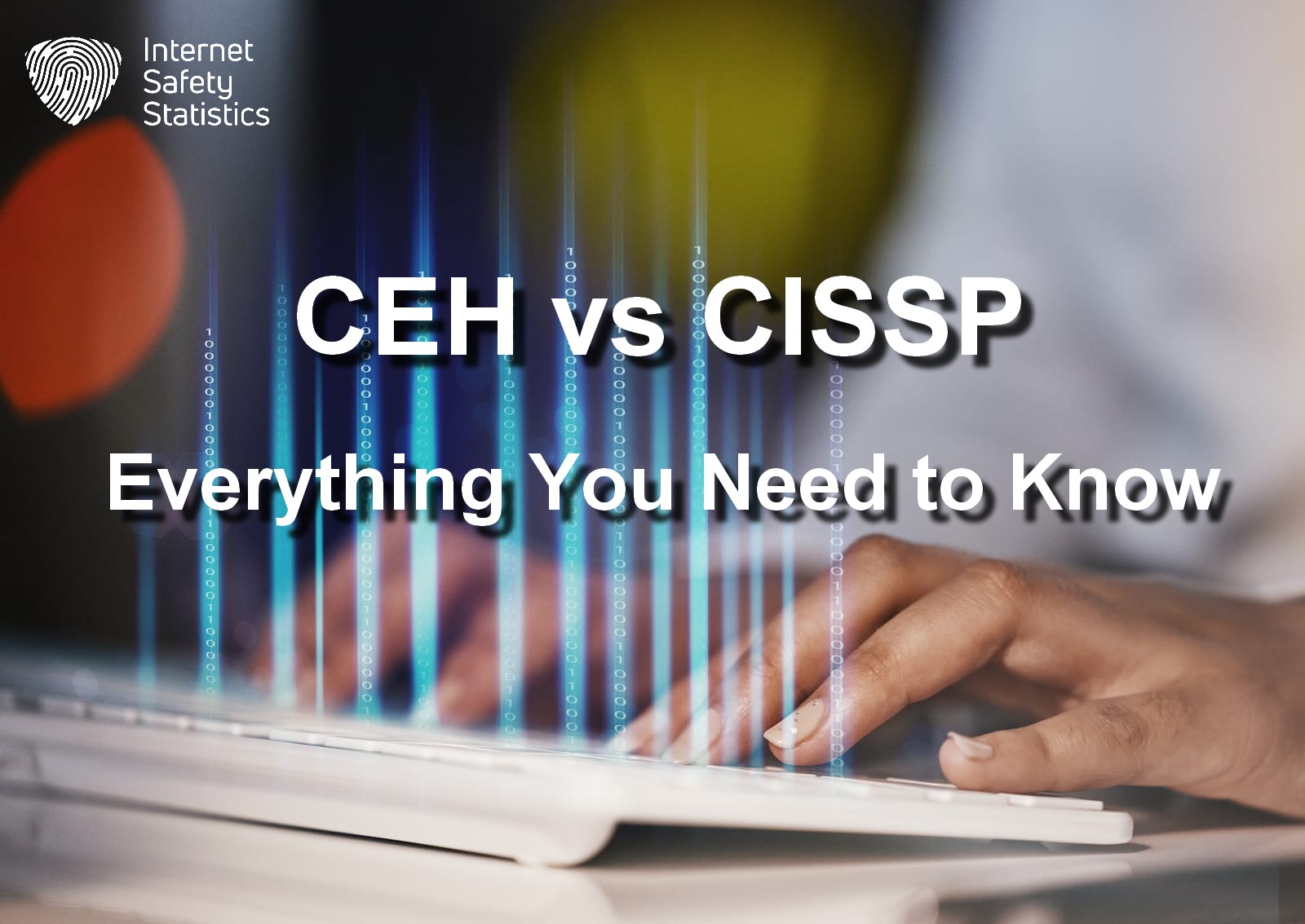
Choosing the proper cybersecurity certification can be daunting, especially with two popular options, CEH and CISSP. Both offer valuable skills and knowledge but cater to different career paths and experience levels. Let’s break down each certification in this comparison of CEH vs CISSP certification to help you decide which is correct.
What is CEH Certification? Everything You Need to Know

The Certified Ethical Hacker (CEH) certification is a vendor-neutral ethical hacking credential offered by the EC-Council. The certification focuses on the technical skills and knowledge needed to understand and counter hacking techniques.
What Does Ethical Hacking Mean?
Think of hackers as detectives, not criminals. Ethical hackers, like CEH-certified professionals, use their skills and knowledge for good. They have permission to simulate cyberattacks to identify system and network before malicious hackers exploit them. This proactive approach helps organisations strengthen their defences and protect sensitive information.
Everything You Need to Know About CEH
Our discussion about Certified Ethical Hackers will include the certification’s focus, study field, and the requirements to prepare for the CEH examination.
CEH Focus
CEH certification focuses on several cybersecurity fields of study, such as assessing vulnerabilities and penetration testing.
Penetration Testing
This testing refers to the simulation of cyberattacks to identify vulnerabilities in systems and networks. CEH covers techniques like social engineering, network scanning and exploitation of software flaws.
Vulnerability Assessment
Your role as a CEH includes identifying and analysing weaknesses in systems and networks before attackers can exploit them. The certification teaches suitable methods for vulnerability scanning, patch management and risk assessment.
Ethical Hacking Methodologies
The CEH certification helps you understand the thought process and tools hackers use to penetrate systems and discover vulnerabilities ethically. CEH also emphasises responsible hacking practices within legal and ethical boundaries.
CEH Prerequisites
There are no formal requirements to apply for the CEH certification. However, basic IT security knowledge is crucial to understand the concepts covered in the exam. This knowledge includes familiarity with network protocols, operating systems and basic security principles. You can utilise the EC-Council’s official training courses covering the CEH CBK to prepare for the exam. There are many other online resources and practice exams to test your knowledge, and you can join online communities and forums dedicated to CEH for further support.
How to Become a CEH?
The road to becoming a successful CEH starts with properly training for the exam and ensuring you have the appropriate level of cybersecurity knowledge to obtain the certification and start your career.
Training
You can train for the CEH certification exam in various ways, including the official EC-Council training options with instructor-led online and in-person courses. You can also use online and office resources, such as books, video tutorials, practice exams, and e-learning platforms, to prepare for the CEH exam. Lastly, you can self-study using the EC-Countil’s official study materials and other resources, but stay disciplined and dedicated.
Exam
Register for the CEH exam through the EC-Council’s website or authorised testing centres. You will pay the required fee, which may vary depending on your location and chosen testing format. Ensure you’re well-prepared for the exam and utilise your study materials well to get the best knowledge.
The CEH exam is a 4-hour, 125-question multiple-choice format. Be sure to arrive well-rested and equipped with proper identification. Manage your time effectively and carefully read and analyse each question before answering.
Continuing Education (CE)
After obtaining your CEH certification, we recommend you continue your cybersecurity education. You need to earn CE credits every three years to keep your CEH certification active. These credits ensure you remain updated with the evolving cybersecurity landscape. The EC-Council offers various CE activities, including attending conferences and workshops, taking approved training courses, participating in online forums, and publishing security-related articles.
Continuous learning keeps your skills sharp and relevant, opening doors to career advancement and demonstrating your commitment to professional development in the cybersecurity field. Remember, consistent effort, adequate preparation, and staying updated are crucial to achieving your goal of a successful CEH.
CEH Exam
The four-hour CEH exam tests your knowledge of the seven domains outlined in the EC-Council CEH Common Body of Knowledge (CBK). These domains cover legal and ethical hacking, vulnerability assessment, social engineering, penetration testing tools and techniques, and more. The exam is computer-based and proctored; you take it at a designated testing centre under supervision.
CEH Difficulty
The CEH certification exam is moderately difficult, with a 60% pass rate. This fact means you must be well-prepared and understand the material well to pass. The difficulty can vary depending on your prior experience and knowledge of IT security.
Average Salary of CEH Specialist
A CEH earns an average of $95,000 yearly. More experienced CEHs earn an average between $75,000 to $150,000.
What is CISSP Certification? Everything You Need to Know

A Certified Information Systems Security Profession is a vendor-neutral information security management credential offered by (ISC)². It focuses on the broader aspects of information security, including security architecture, risk management, and incident response.
Everything You Need to Know About CISSP
Everything you need to know about CISSP includes the certification’s study focus and prerequisites.
CISSP Focus
CISSP focuses on numerous aspects, such as information security management, risk management, security architecture and engineering, and incident response.
Information Security Management
This field covers the principles and practices of managing an organisation’s information security risks. It includes topics like security policy development, incident response planning, and business continuity planning.
Security Architecture and Engineering
Security architecture and engineering focuses on designing, implementing, and maintaining secure systems and networks. It includes topics like cryptography, network security, and cloud security.
Risk Management
This domain teaches you to identify, assess, and mitigate security risks. It includes threat modelling, vulnerability assessments, and risk mitigation strategies.
Incident Response
The last domain covers the process of responding to security incidents. It includes topics like incident detection, containment, eradication, and recovery.
CISSP Prerequisites
To qualify for the exam, you need at least four years of continuous paid work experience in at least two of the CISSP CBK (Common Body of Knowledge) domains. The CBK is a collection of ten fields that cover the core principles of information security.
How to Become a CISSP?
The various steps to becoming a CISSP will take you through gaining work experience, the importance of training, endorsement from a CISSP holder and the path to maintaining your certification.
Gain Experience
Experience is the integral foundation of your CISSP journey. As we mentioned, you need at least four years of paid work experience in at least two of the eight CISSP CBK domains. You can choose from its various areas of information security, such as security architecture, cryptography or incident response. You can still take the exam if you lack the four-year requirement, but you will become an Associate of (ISC)² instead of a full CISSP. You can upgrade to CISSP status once you meet the experience requirement.
Training (Optional but Recommended)
Familiarising yourself with CISSP training courses can be highly beneficial. The courses provide structured learning materials, expert guidance and practice questions to help you master the vast majority of information covered in the exam. The (ISC)² Official Training Partners, or SANS Institute, is a reputable training provider and covers a variety of in-person, online and self-paced training options. Remember that training can help you fill knowledge gaps, enhance your understanding and boost your confidence before taking the exam.
Endorsement
An endorsement from a CISSP holder will verify your professional experience and suitability for the certification. You can look for colleagues, mentors or instructors who hold the CISSP and are familiar with your work. It would help if you chose someone who genuinely believes in your qualifications and is willing to vouch for you.
Continuing Education (CE)
You need to earn CE credits every three years to maintain your CISSP certification. This requirement will prove your commitment to staying up-to-date with new advancements in the cybersecurity field. You can resort to various activities to earn CE credits, such as attending conferences, taking approved training courses and publishing articles or blog posts. It’s essential to keep track of your CE credits and renew your certification before it expires, join online communities dedicated to the exam preparation, communicate with other CISSP holders to gain insights and support and stay focused and motivated to maintain a steady CISSP career.
CISSP Exam
The certification exam is a challenging three-hour test with 125 multiple-choice and essay questions. You can review the CISSP CBK practice exams and familiarise yourself with the format. The pass rate is around 50%, so staying committed to studying and practising before the exam is essential.
CISSP Difficulty
The CISSP is widely considered a challenging certification, and for good reason. Some factors contributing to this difficulty include the certificate covering a vast array of topics across ten domains encompassing all cybersecurity fields. You need a deep understanding of each domain to perform well in the exam. The exam further requires strong analytical and problem-solving skills and knowledge and applying complex concepts in real-world scenarios.
Two more factors include the fifty per cent pass rate, which illustrates the certification’s demanding nature and means that thorough preparation and dedication are crucial for success. The last one is the importance of work experience in the field to ensure a practical understanding of the concepts in the exam.
Average Salary of a CISSP
The average yearly salary for CISSP-certified professionals is $113,000.
CEH vs CISSP Certification: What’s the Difference?
There are multiple differences between CEH and CISSP. These differences are mainly due to each certification’s focus and area of expertise.
Target Audience
CEH is ideal for individuals pursuing a technical and hands-on career in penetration testing, security analysis or vulnerability research. Through CEH, you will have the skills to think like a cyber attacker, identify and exploit security vulnerabilities and recommend effective action strategies. CISSP, on the other hand, is a more strategic and management-oriented certification geared towards cybersecurity professionals with experience. It focuses on developing board knowledge of cybersecurity principles and practices.
Areas of Expertise
CEH focuses on the technical aspects of penetration testing, such as footprinting and reconnaissance, scanning and vulnerability assessment, exploitation of operating systems and applications and social engineering. It also focuses on web application hacking, wireless security, malware analysis, post-exploitation, and reporting.
On the other hand, CISSP certification covers a broader range of security domains, such as security and risk management, asset security, communication and network security, security architecture and engineering, identity and access management, security assessment and testing, software development security and incident response.
CISSP vs CEH: Which Certification to Choose?

Choosing between CISSP and CEH certifications can be tricky, but understanding your career goals and experience level is vital. You should select CEH if you’re new to cybersecurity since the certificate is a great entry point and provides foundational knowledge of hacking tools and techniques. CEH will equip you with the skills to identify and exploit system vulnerabilities, making you a valuable asset for security teams.
You ought to choose CISSP if you have several years of experience in information security since it builds on your existing knowledge. If you’re interested in a management or consulting role since the certification validates your ability to design, implement and manage secure systems and networks.
Role of CISSP and CEH in the Cybersecurity Field
CEH and CISSP are valuable certifications that can open doors to multiple career paths in the ever-growing cybersecurity field.
Career Opportunities for CEH
When you pass the CEH exam, you can work as a penetration tester. You will utilise your newly acquired skills to proactively identify and exploit system and network vulnerabilities before hackers can. Their job involves simulating real-world attack scenarios, reporting findings, and suggesting remediation strategies. Or you can work as a vulnerability researcher, using your strong foundation to identify and disclose new software and hardware vulnerabilities.
You can also work as a security analyst. CEH equips analysts with the technical knowledge to analyse security logs, detect suspicious activity, and investigate potential threats. They leverage their understanding of hacking techniques to decipher attacker footprints and protect systems effectively.
Career Opportunities for CISSP
As a CISSP-holder, you can work as a security architect to design and implement secure network architectures, ensuring data integrity and system resilience against cyberattacks. You can pursue a career in security engineering to utilise your expertise in configuring and managing security technologies, such as antivirus software, firewalls, intrusion detection systems, and encryption solutions.
A security consultant is another career prospect for CISSP-holders, where you provide valuable guidance and expertise to organisations attempting to improve their security posture. The last career path is chief information security officer, who holds the highest leadership position in an organisation’s security team. Their certification validates their ability to oversee the entire security program, manage risks and ensure compliance with regulations.
Now that our certification comparison has ended, we must stress that choosing which certification to pursue depends on your interests, preferences and your level of commitment.
